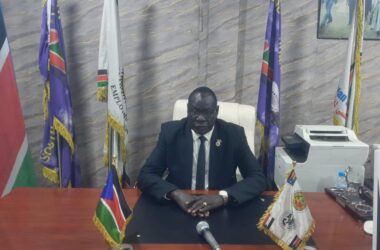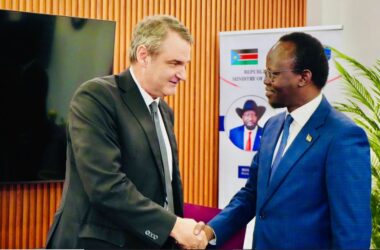
By Philip Buda Ladu
A visiting team of the International Monetary Fund (IMF) from Washington has completed a two weeks’ mission to Juba checking on the progress in the implementation of the Rapid Credit Facility (RCF) and Public Finance Management Reforms agenda by the government.
Chapter four of the Revitalized Peace Agreement calls on political leaders and stakeholders to ensure that the Revitalized Government of National Unity (R-TGoNU) exercise transparency, and accountability with legal institutional policies and procedures fully functional for sustainable development.
The International Monetary Fund (IMF) granted South Sudan RCF loans to help it fight hyperinflation, pay salary arrears, stabilize foreign exchange market to rescue its economy that had suffered shocks from the political crisis, drop in global oil prices and the Covid-19 economic constraints.
On 14th March 2022, Agak Achuil Lual, the Minister of Finance and Planning received the IMF team in his office headed by the Mission Chief for South Sudan, Mr. Nikko Hobdari and discussed issues related to the country’s economy.
The meeting also attended by Ministry of Finance Technical Team touched on economic reforms as reflected in Chapter four of the Revitalized Agreement and how best the international partners can support the reforms agenda the ministry has initiated.
Minister Agak noted that they have embarked on full implementation of the Public Financial Management Reform agenda in the country.
Mr. Nikko Hobdari, the IMF Mission Chief for South Sudan told journalists at the Ministry of Finance’s premises, Friday that they concluded their visit to Juba with meeting the Minister of Finance and the Central Bank Governor.
“We have been here as a team from Washington for the last two weeks, we have been having discussions with the Central Bank, Ministry of Finance, Members of Parliament. The First Deputy Speaker of the Parliament, other ministers and private sector. It has been productive meetings, we are impressed by the economic reforms in South Sudan, since we engaged the leadership of South Sudan for the one and half weeks,” Hobdari said.
He emphasized that the strategic reforms that have been introduced since March last year, it has brought some stability, in regard to the exchange market, reduced prices over the last 12 months and have discussed with the Minister of Finance and the Central Bank Governor on how to sustain those gains and achievements to make sure that stability if very important.
“We were also impressed by the plans of the Ministry of Finance to reduce salary arrears to support civil servants and other government employees by utilizing fuel prices rose by the global developments in recent weeks,” he added.
Moses Makur Deng, the Governor of the Central Bank, said the visiting IMF Washington team mission to Juba could be described as successful.
He said from their part as the monetary society of South Sudan the Rapid Credit Facility (RCF) funds that they had agreed for, can be seen as a successful story for what they have done for the exchange rate reform.
“The monetary targets that we set were all achieved, so what is important is how to continue with these reforms and maintain the stability that had been achieved since March last year,” Makur asserted.
“What is important is to sustain the interventions of the Bank in the foreign exchange market to stabilize exchange rate and that’s why the value of the South Sudanese Pounds is the main target now” the Central Bank Governor stressed. “We will be in close collaboration with the IMF team in Washington and the IMF team here in Juba” he added.
Meanwhile, Simon Kiman Ladu, the First Undersecretary in the Ministry of Finance Planning affirmed the mission of the IMF Washington team visit to Juba.
“The mission is about the Rapid Credit Facility (RCF) that the IMF had given to us to stabilize our economy in terms of salary payments; we have gone through credits and so forth” said Kiman.
Additionally, he said “the other mission is about the article four that looks at how the government performs. We as the government are willing to do the reforms and we have taken these reforms seriously, it is our reforms and the IMF is helping us”.


